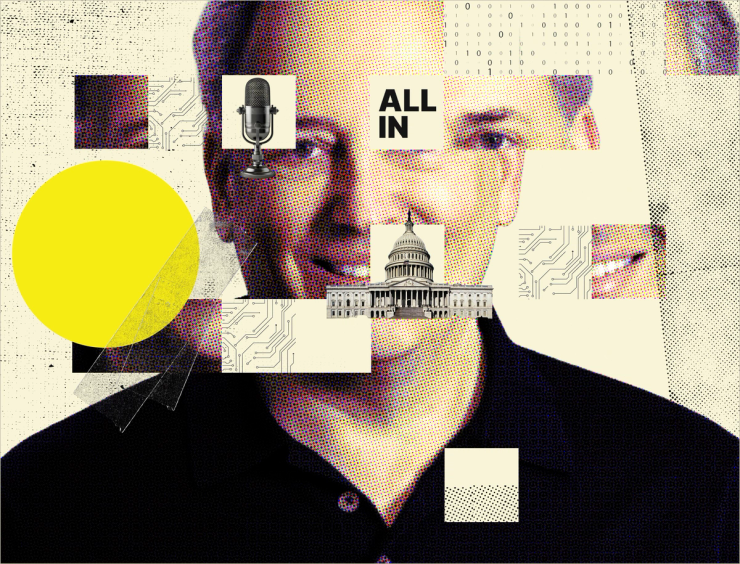The News
The care with which David Sacks tracks his days in Washington has been described to me, variously, as matching the focus of a banker avoiding New York City taxes or as a (pre-GLP-1) dieter on Weight Watchers.
That’s because Sacks, Donald Trump’s AI and crypto czar, is a special government employee, a status that typically limits government service to 130 days a year. That has led some to assume Sacks’ White House run is ending. But Sacks’ days in Washington are non-consecutive, and he has days to spare. Said a White House colleague: “He has no intention of leaving.”
There was good reason to think Sacks would be a short-timer. White House czardoms are a kind of running joke whose grand titles, from drug czar to Asian carp czar, disguise the fact that they’re more often spokespeople than operators. And Sacks, a PayPal Mafia member and veteran Silicon Valley investor, is just the sort of titan of industry this town routinely devours and humiliates — from Rex Tillerson to, well, Elon Musk.
But Sacks (whose spokesperson declined to make him available for an interview even for an article on what he’s done right) has emerged as perhaps the most effective representative of America’s business community in Trump’s new Washington, promising this summer to “let the private sector cook.” While other industries Trump promised to help, from automobiles to manufacturers, have reeled through a challenging year, those in Sacks’ purview — tech in general, crypto and AI in particular — saw the US government rally behind them with a speed and efficiency that’s stunned even the most hopeful Big Tech lobbyists and persuaded some crypto firms to stay in the United States. And the security of Sacks’ relationship with Trump and his staff is reflected by how easily he survived the fallout from his ally Musk’s feud with the president.
“Our good friend David Sacks is really on a heater,” the investor Brad Gerstner remarked recently.
In this article:
Ben’s view
So how is Sacks doing it? In conversations with a dozen people who talk to the czar with varying degrees of regularity, including government officials, lobbyists, and executives, I tried to distill some lessons of power in Trump’s Washington:
1) Media talks, money walks.
Sacks may be a billionaire, but even in this transactional town, there’s a more valuable currency: attention. Sacks is a co-host of All-In, and while he divested millions of dollars in crypto assets, he remains a regular on the popular show. “It’s a whole administration full of rich guys — the podcast and all of that is what’s helpful,” a tech executive who works with Sacks said.
2) Pass the loyalty test.
Sacks joined Trump’s campaign last summer, a month before the shooting at Butler spurred most of Silicon Valley to pile in, and hosted Trump’s first fundraiser in San Francisco, a fact three people who work with the White House said the president remembers well. He goes out of his way to demonstrate loyalty, whether by storming out of a group chat that had turned Trump-skeptical or by participating in the display of adulation at last week’s tech dinner. “David goes out of his way to [show] his loyalty, and the president knows that,” a Sacks ally said. A second tech executive noted that Sacks earned a “tremendous amount of goodwill” in the White House by being “willing to defend them even if it’s outside his domain.”
3) Respect the staff.
Trump’s intensely centralized, personal presidency can give some of the leader’s friends and peers in business the impression that they don’t need to bother with the small circle of West Wing political staffers and core Cabinet secretaries. Musk, for instance, thrived at first through his direct link with Trump. But Sacks has gone out of his way to socialize his crypto and AI pushes with chief of staff Susie Wiles, Commerce Secretary Howard Lutnick, and other aides. “I’m impressed at how well he has adapted to being a senior staffer,” said the first tech executive. In meetings, “you wouldn’t know he had a long and successful business career before getting there.”
4) Get industry support.
Sacks is also succeeding in spite of a quality that is sometimes the subject of disdain in this administration, but which has made him popular across the balkanized industries he engages with: He has deep, traditional subject-matter expertise. While Trump friend Steve Witkoff leads diplomatic engagement and Robert F. Kennedy Jr. outrages doctors and pharmaceutical executives, Sacks and his small team — a Republican former college football star, Bo Hines, until recently led the crypto push while the gangly, mild-mannered venture capitalist Sriram Krishnan focuses on AI — know the industries they’re championing in more detail than their Biden-era predecessors.
In July, Sacks and Trump pushed the GENIUS Act, which established a legal framework for stablecoins, through Congress. That transformed the industry by giving it a clear American base — and by pacifying agencies like the Securities and Exchange Commission that had been, under Biden, openly hostile. “They have navigated a difficult transition of taking a Country that OPPOSED crypto to one that EMBRACES it,” said MoonPay president Keith Grossman in an email. “It’s like whiplash in the best way from the previous administration,” said Haun Ventures chief marketing officer Rachael Horwitz.
AI is trickier: Sacks’ goal has been largely to create a sense of progress and momentum around AI while, on the domestic front, doing nothing, and simultaneously navigating complex export questions. The industry was thrilled by Trump’s AI action plan, but disappointed when some Senate Republicans refused to sign on to a measure that would have blocked state-level regulation. But Sacks has managed to win the trust both of the newly-rebranded patriotic American AI champions (formerly known as hated Big Tech) and of the smaller firms that Sacks would have invested in as a venture capitalist.
“He and Sriram constantly engage with the sector,” said one senior AI executive, who said he sees “more proactive outreach on a weekly basis than Biden did in four years.”
Sacks is continuing to work on behalf of the industries he represents in the White House. Crypto advocates — not least the president’s sons — are pushing for more legislative normalization. AI, meanwhile, is counting on Sacks, Krishnan, and science adviser Michael Kratsios to use federal power to fend off regulatory calls from well-organized AI safety advocates.
Room for Disagreement
Sacks isn’t universally beloved in Silicon Valley. Rippling founder Parker Conrad, who earlier founded the HR company Zenefits, worked with Sacks when he joined as COO — until Sacks ousted him and took over as CEO. It’s something he hasn’t forgotten, as evidenced by a public spat the two had on X last year, and Y Combinator co-founder Paul Graham took Conrad’s side.
Notable
- That first San Francisco event — at Sacks’ personal home — ran attendees $50,000 apiece, The Washington Post wrote.
- Sacks privately disapproved of some of Trump’s early crypto moves, such as a stated plan to expand the US strategic crypto reserve to more niche tokens, The San Francisco Standard reported.
- The crypto industry’s next goal is a permanent regulatory framework, but it’ll need Congress for that, Semafor’s Eleanor Mueller writes.
Correction
An earlier version of this column misstated the guidelines for special government employees.


